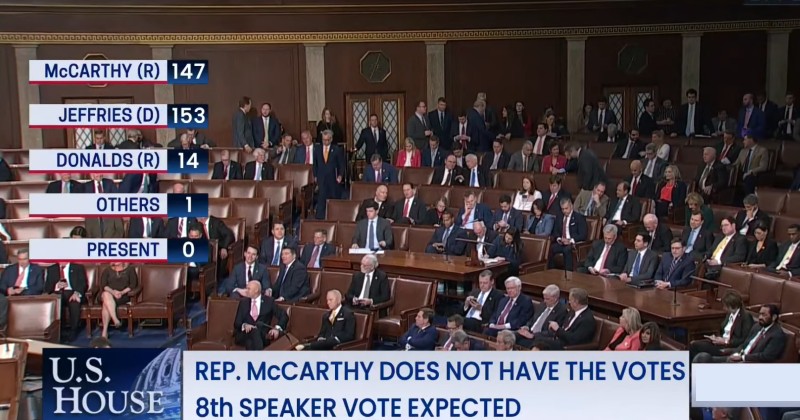The humiliating days-long spectacle of allowing the top candidate for House speaker to go down in flames in failed vote after failed vote is an unprecedented public display of intra-party dissension – at least this century. But it’s not entirely unexpected.
House Republicans have a recent history of engaging in bruising battles with their own leaders that wounded previous GOP speakers and left others rushing for the exits.
Perhaps this propensity to hobble those entrusted with authority comes with the territory – distrust of governmental power is an integral part of the modern GOP’s DNA. But this week it hasn’t been a pretty picture.
The House adjourned Wednesday night after six consecutive votes over two days failed to pressure any of a recalcitrant group of 20 Republicans to change their minds and hand the speaker’s gavel previously held by Nancy Pelosi to her fellow Californian, Kevin McCarthy.
If anything, McCarthy appeared to lose a little ground as the embarrassing roll calls repeated themselves with no movement from the rebels. Rep. Victoria Spartz, an Indiana Republican and McCarthy supporter, voted “present” beginning in the fourth round to encourage Republicans to stop voting, take a break, gather as a conference, and come up with a new plan.
Rep. Mike McCaul, a mainstream Republican from Texas and the incoming chairman of the House Foreign Affairs Committee, appearing on Fox News, deemed the unpredictable ordeal an embarrassment on the international stage.
Yet, for the group of disruptors, it was all according to plan and part of well-worn quarter-century-long House GOP practice. Starting with Newt Gingrich, who was responsible for helping Republicans win back the majority for the first time in 40 years, and continuing with nearly every GOP speaker since, a small group of fractious House hardliners hasn’t hesitated to punish their top GOP leaders for missteps – real or imagined.
Some of the offenses that have spurred modern-day GOP mutinies include underperforming in elections, the ambiguous charge of ineffective leadership, or consolidating too much power in their leadership roles.
Over the last several days, Fox News and CNN pundits alike, along with McCarthy’s supporters, have derided the spectacle of watching McCarthy go down in defeat multiple times. Rep.-elect Dan Crenshaw, a Texas Republican, labeled the holdouts “terrorists” and “enemies of the state.” Rep.-elect Don Bacon of Nebraska, another McCarthy ally, upped the ante, dubbing the conservative rebels the “Taliban 20.”
The last time the House failed to elect a speaker was 100 years ago, and McCarthy has negotiated with his critics and capitulated to most of their demands. But the small band of GOP McCarthy opponents has stood firm.
“We’re doing exactly what the people want us to do … trying to make sure we stand up and represent our constituents against a swamp that is basically rolling over them – with a $1.7 trillion omnibus spending bill,” Rep.-elect Chip Roy, a Texas Republican and a top leader of the conservative revolt against McCarthy this week, told Fox News’ Bret Baier Wednesday night.
Roy was referring to the decision by Senate Minority Leader Mitch McConnell to cut a deal with Democrats just before the holidays to fund the government until September. The bill’s timing forced fiscal hawks in the conservative Freedom Caucus to vote yes or no on a 4,000+ page bill containing 7,200 earmarks for pet projects in lawmakers’ districts – that they had no time to sift through.
If the Senate had not foisted that bill on House Republicans, McCarthy likely wouldn’t be facing such an effective revolt, some fiscal hawks argue.
“Ultimately, the battle is over whether we’re going to have a powerful speaker who can dictate anything that the House is going to do,” said Richard Manning, president of Americans for Limited Government, an organization with close ties to several of the McCarthy opponents. “Or are you going to have the power be diffused so that more people are involved in making decisions about what bills are allowed on the floor and what they look like?”
“That’s inconvenient for a speaker because it takes away a lot of the speaker’s power, but I don’t think any Republican would say we want to have a Pelosi on the right,” Manning added.
Unlike Republicans who have shaken up their leadership teams after significant election losses, House Democrats welcomed Pelosi back to the speaker’s office in 2018, when they regained the majority after an eight-year stint in the minority. (Pelosi never left the top Democratic minority leadership post when she was forced to give up the gavel in those intervening years.)
House Democrats also allowed Pelosi to consolidate more power in the speakership when she faced rebellions from an unruly faction in her caucus. Amid several revolts from “The Squad,” a group of progressive young rabble-rousers led by Rep. Alexandria Ocasio-Cortez, Pelosi managed bills tightly in her final years in office. Last year, she tightened her grip on the legislative process even further by implementing a rule change that eliminated a century-old bipartisan protection giving the minority party the right to offer amendments.
The party in power usually has sought to limit the minority’s ability to amend bills and shape debates, but the 2021 rules change allowed no exceptions.
“Pelosi consolidated power and actually made it very difficult on the minority … but that’s not how the speaker’s office should be run,” argues John Feehery, who served as press secretary for former GOP Speaker Dennis Hastert. “What Pelosi did is trounce minority rights, achieving a kind of left-wing agenda. We shouldn’t be doing what Pelosi did. We should be doing the opposite.”
Although Feehery has supported McCarthy, as of early Wednesday he no longer saw a path forward for him without bigger concessions that would allow a more open legislative process and far greater opportunities for rank-and-file members to debate issues and bills. Sam Rayburn, the longest-serving speaker in history, was so successful because he ran a transparent process with open rules allowing for free-flowing debate and many amendments, Feehery argued. The Texas Democrat was elected speaker three times, serving when his party was in the majority from 1940 to 1947 and again from 1949 to 1953, and a third time from 1955 to 1961.
McCarthy and his supporters counter that he’s made numerous concessions to win over his detractors, who keep upping their demands. But the holdouts contend that many of the rules changes are window dressing with no teeth.
For instance, McCarthy has agreed to prevent future omnibus spending bills by requiring members to limit bills to a single subject, but that proposed rule change lacks an enforcement mechanism.
Roy and his allies are now demanding McCarthy give their “Freedom Caucus” at least three seats on the House Rules Committee, the panel that determines what bills and amendments make it to the House floor for votes.
Another demand would allow a single member to call up a vote to oust the speaker from office. Known as “vacating the chair,” the resolution aims to create more accountability for McCarthy or whomever ends up as speaker.
A successful vote to vacate the chair could remove a sitting speaker, but only if a majority of members vote in favor of such a dramatic move. Supporters argue it’s not a draconian step, but simply the overturning of a bad precedent started by Pelosi in which a majority of the members of either party was required just to call it up on the floor.
McCarthy shouldn’t fear the rules change, Feehery says, because it’s seldom used and rarely removes a speaker.
Rather than letting such an embarrassing and disruptive vote play out, however, GOP leaders over the last three decades have simply seen the writing on the wall or have grown weary of the infighting and resigned on their own. But such attempted coups do take their toll.
House Speaker Newt Gingrich survived an aborted coup only because then-Majority Leader Dick Armey snitched on the organizers when he realized he wasn’t their choice for the top House post. Gingrich was eventually pushed out after House Republicans lost seats in the 1998 midterms. His successor, Hastert, who occupied the top House post from 1999 to 2007, knew he would face a similar fate after a 31-seat GOP loss handing Democrats the majority, and resigned from Congress. (Hastert in 2016 was convicted of paying hush money to a child sex victim he assaulted years earlier while serving as a high school wrestling coach, but the case had nothing to do with his exit from Congress.)
John Boehner decided to resign from the speakership – and Congress itself – after two years of tangling with House Freedom Caucus members over a series of intense spending battles and government shutdowns. The 12-term Ohio Republican faced a motion to vacate the chair from then-Rep. Mark Meadows but left Congress before the vote, in part because he didn’t want to make members “walk the plank” and decide whether to back him or not, he said at the time.
Boehner’s problems could provide lessons for McCarthy.
Boehner began his tenure as speaker with quiet backroom deals and outreach to all factions of the GOP conference. But after the Tea Party movement ushered in a powerful new group of fiscal hawks willing to shut down the government and default on the nation’s debts to extract spending cuts, Boehner started severely limiting amendments from fellow Republicans. The move to centralize decision-making angered Meadows and other Freedom Caucus members who wanted Boehner removed from power.
In Meadow’s motion-to-vacate resolution, he argued that Boehner had “endeavored to consolidate power and centralize decision-making, bypassing the majority of the 435 members of Congress and the people they represent.”
Feehery never thought Boehner was in trouble of losing such a vote. He was popular enough among most House Republicans to survive against any challenger, and Democrats weren’t going to support any effort to replace him with a more conservative alternative.
The same would be true of McCarthy, Feehery argues.
But Boehner had grown tired of all the infighting and abruptly quit. Former Rep. Paul Ryan, Boehner’s reluctant successor who stepped up after McCarthy lacked the votes in 2015, followed suit two years later after his own battles with hardliners and frustrations over President Trump’s unpredictable and truculent outbursts. Ryan made his decision to resign from Congress after passing the Trump tax cuts and a major tax code overhaul, a longtime goal. It was the spring before the 2018 midterms that were already boding poorly for Republicans and eventually cost them 41 seats and the majority.
With Republicans wresting the majority back this year, albeit by a razor-thin margin, the holdouts argue that McCarthy has a chance to learn from the mistakes of past GOP Speakers. If he wants to lead the House, he needs to cede some power to rank-and-file fiscal hawks determined to put the brakes on spending and change other top-down Washington practices.
“You can put whatever you want in the rules, but if they can be waived away magically because Mitch McConnell and the leadership of the House decided to jam through a bill, then we have no say,” Roy said Wednesday night. “So, this is all about defending the American people against the swamp.”
But even as he defended the protracted public display of GOP dissension, Roy didn’t appear to be abandoning McCarthy altogether. The Texas Republican notably didn’t suggest an alternative candidate. Instead, he seemed to be searching for an off-ramp, noting that negotiations with McCarthy were continuing into Thursday evening.
“We’re having conversations right now,” he said. “We’re making progress, but we’ve got a long way to go.”
Susan Crabtree is RealClearPolitics’ White House/national political correspondent. This article was originally published by RealClearPolitics and made available via RealClearWire.










